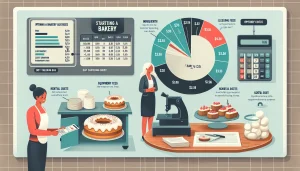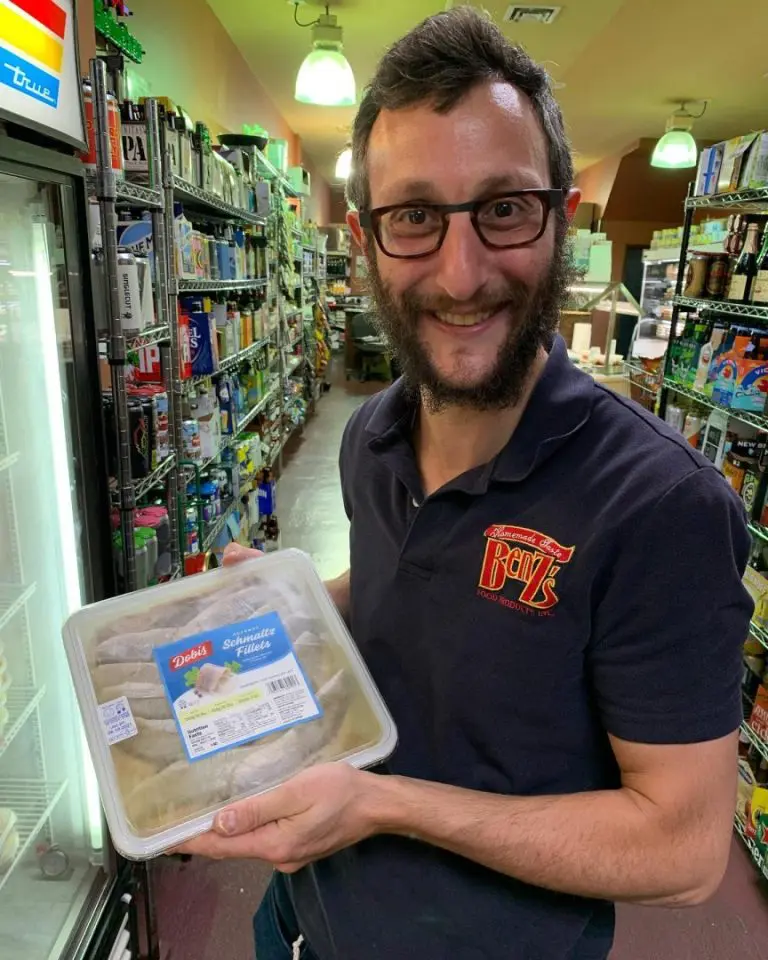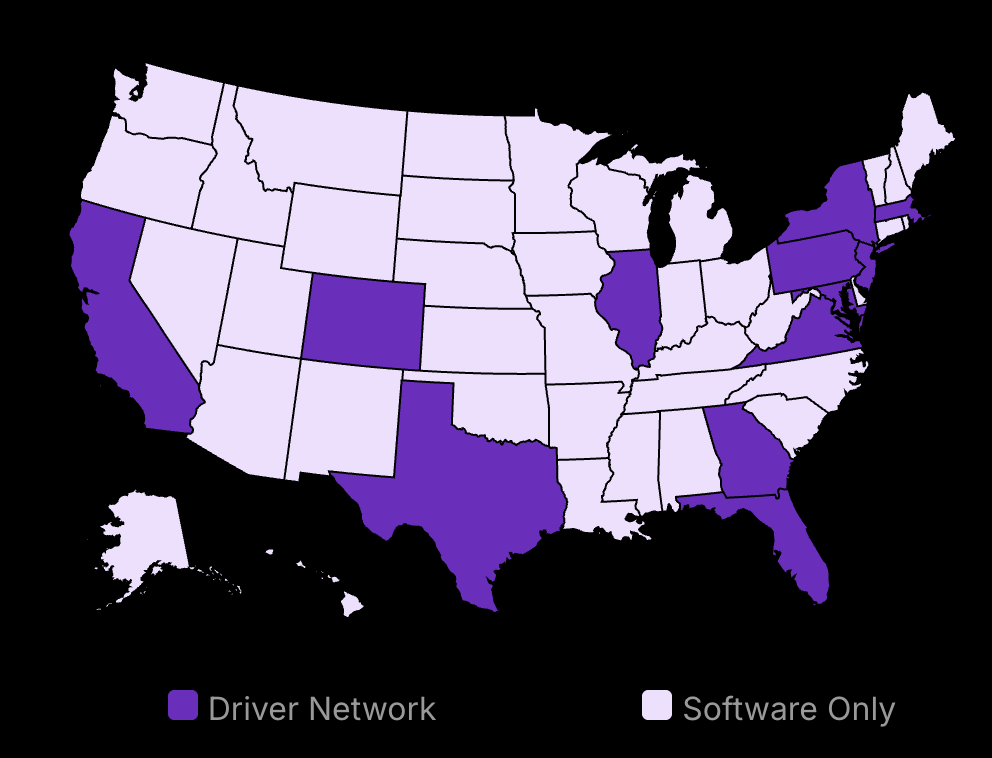Bakery lovers, rejoice!
Starting a bakery business from home isn’t a cherry-topped dream anymore. It’s an actionable reality that’s easier than you think.
Wake up to the tantalizing smells of freshly baked bread, celebrate milestones with your signature confections, and build a circle of loyal customers! No fancy storefronts are required, no binding expenses, just your kitchen, your craftsmanship, and our guide to guide you through. Uncover the secrets to launching your own bakery business in 2024, exploring trends, equipment, and tips for success designed for emerging bakers.
“In-home bakery revolution is not a fad, it’s an entrepreneurial reality!”
Delving into this bakery bandwagon isn’t as grueling as scaling Mt. Everest. Each year, hundreds launch successful home-bakery businesses. Comparable to the population of a small town, these determined home bakers sell and are turning their passion into a flourishing trade, right from their residential kitchens.
Ready to roll up your sleeves and start a home bakery? Let’s knead into the doughy details of starting a bakery business from your home kitchen.

Save 80% of delivery management time
We handle everything:
- Dedicated operations manager
- Real-time tracking dashboard
- Automated customer notifications
- Urgent issue resolution
Step-by-Step Guide to Starting a Bakery Business from Home
Step 1: Crafting Your Home Bakery Business Plan
A comprehensive business plan acts as a roadmap in your journey to establish a successful home bakery cottage food. It provides clarity, and a business structure, setting clear goals and outlining the actions required to achieve those goals. Here’s what it should include:
- An executive summary that encompasses your business’s purpose, vision, and mission.
- A detailed description of your products, highlighting what makes them unique.
- A market analysis providing a snapshot farmers market and of your potential customers, competitors, and market trends.
- Your marketing and sales strategies, outline how you plan to both attract more customers, and retain customers.
- Your financial projections, budget, and pricing strategy.
Crafting Your Executive Summary
The executive summary is essentially a condensed version of your full business plan. Think of it as an elevator pitch for your bakery. It should quickly tell potential investors or lenders what your business is about, why it will be successful, and what you’re asking for. Explore the crucial manual for launching a bakery in 2024, addressing future trends, necessary equipment, and effective tactics for budding bakery owners.
Defining Your Products
What are your specialty baked goods? Who is your first target market or audience? In this part of your business plan, you need to be specific about what and selling home-baked goods you’re selling. Offering unique products that sell baked goods that aren’t readily available in the market could be one way to carve out a niche for yourself.
Average Prices for Essential Bakery Equipment 💰🥐
- Commercial Oven: $5,000 - $15,000
- Mixer: $500 - $2,000
- Dough Sheeter: $2,000 - $5,000
- Bakery Display Case: $1,000 - $5,000
- Weighing Scale: $50 - $200
Performing a Market Analysis
Understanding your market is a critical step towards success. It helps you identify potential customers, understand your competition, and recognize upcoming trends in the bakery industry. This section requires in-depth research. Dive into our comprehensive guide to uncover the prime bakery locations, showcasing the most cherished and undiscovered spots across the country for top-tier baked delights.
Developing Marketing and Sales Strategies
How will you get the word out about your home bakery? What promotions will you run to attract customers? What sales avenues will you use? Answer these questions while crafting your strategy. Your market research and analysis should guide you here.
Drawing up Financial Projections
Budgeting is essential in any business. Knowing your numbers helps you manage your finances and measure progress. Include your projected revenue, expenses, profit and loss statement, cash flow statement, and balance sheet. Unlock the true expenses and financial landscape of starting a bakery venture in 2024 by exploring our comprehensive guide on the costs involved in opening a bakery business.
Step 2: Understanding the Legal Requirements for Home Baking Business
Before starting your own home bakery hobby baker or cottage food and business, it’s crucial to know the various legal aspects involved. This includes obtaining the necessary permits and licenses, adhering to specific, home bakeries and bakery laws local regulations, understanding zoning laws, and ensuring that you comply with local governments’ health food safety, and sanitation regulations. Discover how to initiate your own bakery business in 2024, covering everything from crafting a distinctive bakery idea to handling the intricacies of obtaining permits, understanding local legislation, and navigating the day-to-day challenges of operating a successful bakery.
Obtain the Necessary Permits and Licenses
Before you can open your home bakery, you’ll need to obtain a collection of permits and licenses. These may include a business license, a home occupation permit, or a food handler’s permit. The exact requirements vary by location, so consult local authorities or a business solicitor to understand your legal responsibilities. Discover the essentials of launching a successful home bakery in 2024, including navigating the permit process, acquiring the right licenses, and mastering everything from crafting a distinctive bakery concept to efficient operations and financial management.
Understand Home Bakery Laws
Are there limits on the type of equipment you can use? How about the quantity of goods you can produce? Each region has its home bakery laws and it is important to familiarize yourself with them.
Know Your Zoning Laws
One crucial aspect not often considered is whether or not your house is zoned for running a home-based bakery. Zoning laws could potentially limit the type and volume of business activities you can conduct from a home-based bakery too.
Compliance with Health and Sanitation Regulations
Keeping a clean and sanitary home baking environment is vital not just for legal food safety reasons, but also to keep your customers safe. Understand what health and proper food handling, food safety certification, and sanitation rules apply to commercial food production in your home bakery, and ensure you adhere to them stringently.
Step 3: Setting Up Your Baking Space and Procuring Essential Equipment
Once your business plan is in place and you understand the legalities of running a home bakery, you’ll need to set up your home baking space and equip it.
Setting Up Your Baking Space
When choosing your baking space, consider practicalities such as storage for ingredients and finished products, counter space for baking, and an area for cleaning dishes. Ensure the space is organized in a way that promotes efficient workflow.
Procuring Essential Equipment
Your equipment forms the backbone of your home bakery. Depending on what you plan to bake, you will need to acquire ovens, mixing tools, cooling racks, baking trays, and more. Remember, investing in high-quality equipment can enhance your productivity and save you money in the long run.
Kitchen Tool Preferences in the U.S. 🍳🥄
About 55.6% of U.S. consumers planned to buy cooking utensils within the next year. Furthermore, 51.9% of them prioritized product quality/performance when selecting home kitchen tools and gadgets.
Now armed with a detailed plan, a deep understanding of the legal landscape, various homemade baking techniques, show techniques, and a well-equipped home baking show space, you’re poised for success in your own home bakery business.

Metrobi is transforming bakery deliveries
Specialized solutions for bakery businesses:
- Bakery-trained drivers
- Proper handling equipment
- Peak day delivery support
- 23% average cost reduction
Effective Marketing Strategies for Your Home Bakery Business
A solid online and social media presence brings your home bakery business to the fingers of potential customers while allowing for effortless marketing. An effectively built online image is instrumental in attracting and retaining customers.
Harness the power of social media for your home bakery business. Most customers spend a significant amount of their time on social media platforms. Leveraging this can put your business at the forefront of their attention. Facebook and Instagram are ideal for showcasing your bakery’s appealing visuals, facilitating interactions with customers, and gathering much-needed customer feedback.
Social Media Impact on Home Business Owners 📈🏡
As many as 93% of small-medium business owners incorporate social media into their marketing strategies, with 70% successfully gaining customers through social media campaigns.
Business websites can go a long way in shaping a professional image. Ensure an easy-to-navigate, aesthetically pleasing website capable of showcasing your products and offering an easy ordering system. SEO strategies can improve your website’s visibility, making it the first point of contact between your business and potential customers. Following these tips will help you set up a successful website for your bakery, allowing you to showcase and sell your baked goods like cookies, cakes, and pies effectively online.
Leveraging Local Networks and Events
While thriving online is vital, do not underestimate the power of local community engagement. The first start of a bakery business, home bakery, or business intertwines closely with the community as a primary customer base. A strong local network can exponentially affect your first start of a bakery business or home bakery’s success.
Investing time and resources into attending local events and festivals can expose your home bakery to untapped customer bases. Participating in farmer’s markets, food fests, and carnivals can create essential face-to-face encounters with potential customers, and personalized interactions that online platforms can’t offer.
Building relationships with local businesses and joining business associations can establish cross-promotion opportunities. An ally in a non-competitive local business can lead to beneficial collaborations. For example, a deal with a local coffee shop might include offering your pastries for sale at their location. Consider this an expanded display area.
Never underestimate word-of-mouth marketing. Consumers tend to trust recommendations from friends, family, or peers more than any advertisements. Encourage satisfied customers to spread the word within their network.
Your home bakery’s success doesn’t simply lie in the quality of your pastries or how well you can resolve financial hurdles. It also heavily relies on your ability to effectively navigate the marketing and networking avenues available. This not only raises the visibility of your home bakery but also establishes it as a trusted choice in the hearts of consumers.
Understanding the Profitability of a Home Bakery Business
Low Startup Costs
Knighting a home bakery business, your expenditures aren’t as tremendous as opening a storefront bakery. Begin with essential baking equipment, and upgrade as your operation expands. A well-planned incremental growth lessens financial risks and returns on investment are noticeable quicker.
Potential Earnings from Baking 🎂💰
Specializing in large event cakes could generate about $1,000 monthly. Meanwhile, taking a few individual custom orders weekly might average around $300 monthly.
Home Bakers Don’t Need Expensive Licenses
Running a bakery from home often means you’ll avoid the expensive permits required for a commercial bakery. However, be aware of health department inspections and necessary certifications. Thoroughly research your local and state regulations to ensure you stay within the law.
Overhead Costs are Almost Non-existent
The operational costs of a home bakery business are considerably lower than traditional bakeries. You already pay rent or mortgage for your home, so there’s no additional real estate expense. Consider your utility bills though as the operation might heighten your energy usage. Nevertheless, these costs you can recover from your product pricing.
No Need for Additional Staff
The early stages of a home bakery business typically don’t require hiring employees. You can likely handle all the tasks from baking to packaging and delivery. However, as your home baking business grows, factoring in labor costs will be necessary.
Demand for Home-Baked Goods
Homemade bakery goods have a strong presence in the food business. Consumers appreciate the distinct tastes not found in store-bought baked goods. The trend for home-baked commodities means a steady source of income for your business.
🍰 The Sweetest Slice of Bakery Sales 🍰
In the bakery industry, cakes lead with the largest portion of total sales, accounting for 24%.
Specializing in Niche Products
Focusing on a unique product can improve your profitability. Niche markets like gluten-free, vegan, or organic baked goods are gaining traction. Customizing your offerings to fit those on special diets or with health restrictions can boost your home bakery business’s success.
Remember the income stream is tied up with your ability to produce high-quality, consistent products. Prioritize customer satisfaction to encourage repeat business and positive word-of-mouth marketing.
Common Challenges in Running a Home Bakery and How to Overcome Them
Maintaining Work-Life Balance
Operating a home bakery can often blur the lines between your professional and personal life. This is especially true when your kitchen doubles as your workspace. However, you can manage this dichotomy effectively with some meticulous planning and discipline.
Planning Your Day
Start by allocating specific hours to your business and sticking to the schedule. This not only allows you to focus on your own business when required, but it also carves out time for your personal life, rescuing you from a never-ending workday.
Creating a Separate Workspace
Designate an area of your home solely for your bakery. This physical separation will serve as a visual reminder to switch on and off from your work mode.
Ensuring Consistent Quality and Variety
Producing consistent quality and keeping up with variety is a key part of running a successful home bakery. This may seem tough, but with some strategic planning and execution, it’s quite attainable.
Quality Comes First
Constant quality is crucial. This not only helps in maintaining customer satisfaction, but also builds your brand reputation. Stick to quality ingredients, and repeatable processes, and maintain high standards of hygiene.
Diversity in Offering
Offer a wide array of products that can cater to different preferences and dietary needs, but don’t stretch yourself thin. Find your signature dishes, and then extend your range gradually, making sure each new addition meets your quality standards.
Cookie Dominance in Bakeries 🍪
In bakery production, cookies top the list at an impressive rate of 89%.
Managing Business Growth
As your home bakery flourishes, managing growth without compromising quality or customer satisfaction can be challenging. Effective scaling strategies are vital for smooth business expansion.
Scaling Gradually
Rapid growth can lead to quality issues. Gradual scaling allows for better control over the growth process. Start by taking larger orders or adding a few more items to your menu before venturing into hiring staff or expanding workspaces.
Effective Use of Technology
Leverage technological tools for efficient management as your business expands. Tools can help with inventory management, customer communication, or even order deliveries, freeing up your valuable time.
Engaging Through Social Media 📲
A significant 77% of businesses utilize social media to connect with their customers.
While challenges are inevitable, they can be overcome. The key lies in planning, maintaining quality, and managing growth effectively. Starting a home bakery is indeed easier than you think. With a few tips and these strategies at hand, you’re well-equipped to rise to any challenges.
Frequently Asked Questions About Starting a Home Bakery Business
What legalities do I need to consider for my home bakery?
Operating a home bakery is not quite as simple as firing up your oven and selling on the next-door marketplace app. It includes various legal considerations. Firstly, familiarize yourself with your local health department’s requirements for home bakeries. This may comprise food safety certifications or permits and, sometimes, venue inspections. Each state or country has differing guidelines, so it’s essential to research this thoroughly.
Secondly, depending on where you are located, you may need to get a business license. This process typically requires a basic application and can often be done online. Finally, you’ll need to consider local zoning laws, as some residential areas don’t allow for commercial operations like home bakeries.
Lastly, business insurance can be a lifesaver. From protecting against equipment damage to potential liability issues, it’s a prudent move to seek insurance that fits your needs.
How do I budget for my home bakery?
Budgeting for a home bakery isn’t as straightforward as buying flour and eggs. Generally, start-up costs for home bakeries can vary significantly. In the initial stages, apart from raw materials, you might need to factor in the cost of new equipment or renovations to your cooking space to meet health code standards. Additionally, consider ongoing costs such as utilities, licensing fees, insurance, and marketing expenses.
Without a doubt, creating a business plan and budget should be your primary move. For funding, alternatives may include savings, seeking a small business loan, or exploring grant opportunities. Knowing your costs upfront can indeed provide you with a competitive edge, helping you price your goods appropriately and turn a profit.
How do I market my home bakery?
Marketing a home bakery can be even more critical than having the perfect sourdough recipe. Building a strong customer base often begins with family, friends, and neighbors who can help spread the word about your business. However, don’t just rely on word of mouth – take advantage of social media platforms like Instagram or Pinterest, which are stellar for showcasing your culinary creations. Considering taking your home bakery to the next level? Learn how to craft a bakery site that captivates your audience and enhances your sales.
Consider setting up a simple website where potential customers can learn more about you, view your products, and possibly place orders. Also, local farmer’s markets or small businesses could be an opportunity to showcase your products and increase local recognition.
Remember, your brand sets you apart from your competitors, so ensure it represents both you and what you want your bakery to be. Regularly engaging posts, excellent customer service, and consistently high-quality products are non-negotiables in maintaining a strong brand.
Choosing the Right Platform for Growth 🌐
While 30% of small businesses promote on Instagram, a notable 61% consider LinkedIn crucial for their expansion.
Kneading Your Way to a Home-Based Bakery Business!
With ease of set-up, cost-effectiveness, and freedom to innovate, starting a bakery business from home is simpler than you may have anticipated. Plus, who wouldn’t appreciate being the neighborhood’s favorite dough magician?
But remember, every loaf and every biscuit baked adds to your proficiency. Use this wisdom to create a diverse menu that caters to different palates. Focus on building a community first, and profits will follow.
Are you ready for the recipe for success? Tuck in that apron and start by experimenting in your kitchen. Begin with testing small batches of creativity, then gradually scale up. Reach out to local cafes and farmer’s markets and watch your business rise, loaf by loaf!
Now, the real yeast test – what’s the first bake you will offer your customers? Ponder on it while your oven preheats!
So, it’s showtime! Roll out the dough of your dedication and carve out the delicious journey you always dreamt about. As a home-based bakery business owner yourself, are you baking your life, or cooking up a dream? Think about it, baker!





























